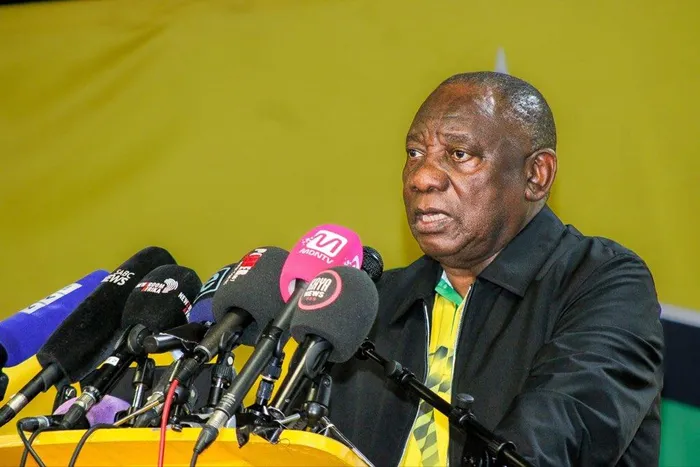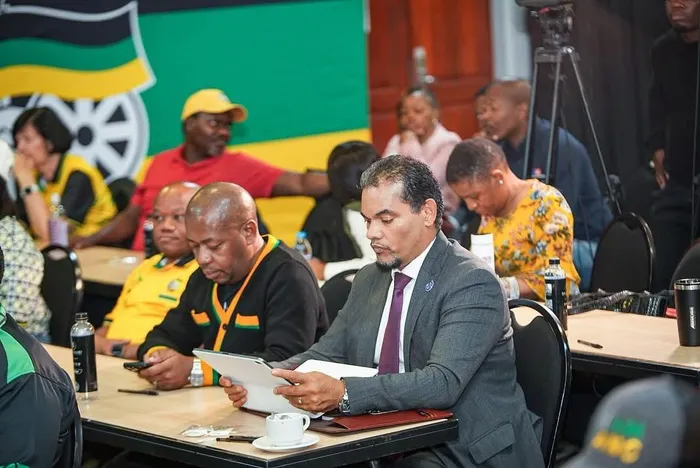
ANC President Cyril Ramaphosa unveils a 10-point plan to tackle poverty, unemployment, and the high cost of living.
Image: X/ANC
ANC president Cyril Ramaphosa has described the ongoing impact of poverty, unemployment and the high cost of living on South Africans as “unacceptable”, as he unveiled a 10-point plan aimed at stimulating economic growth and job creation.
Ramaphosa presented the plan during the ANC’s special National Executive Committee (NEC) meeting held at the Birchwood Hotel in Ekurhuleni, where discussions focused on key interventions to accelerate inclusive growth and employment.
“This special NEC meeting follows an extensive discussion in August 2025, where the NEC discussed the state of the economy and outlined key actions that need to be taken to give effect to the Medium Term Development Plan that has been adopted by the government,” Ramaphosa said.
“The discussion was informed by the three strategic priorities of the seventh administration: firstly, to drive inclusive growth and job creation; secondly, to reduce poverty and tackle the high cost of living; and thirdly, to build a capable, ethical and developmental state.”
He said they were discussing all three matters guided by the resolutions of the ANC’s 55th National Conference in December 2022 and the 2024 national and provincial elections manifesto, which reaffirmed their commitment to a fundamental transformation of South Africa’s economy.
“The NEC reaffirmed our commitment to broad-based black economic empowerment to ensure that we correct the injustices of our past and end the inequality of the present moment.”
Ramaphosa said the ANC had identified specific interventions to advance the vision of the National Development Plan and the economic programme of the government and the Medium Term Development Plan.
“These interventions are intended to support the government's proposed implementation plan on growth and inclusion, and inform the annual performance plans of various government departments.”
“In undertaking this work, we are not seeking to start from scratch.”
“We have made progress over the last few years in advancing economic restructuring and transformation, in improving our capacity to increase infrastructure investment, for which we have budgeted R1 trillion, and in using public programmes to support employment and livelihoods,” he said.
He said they also welcomed in particular the progress made in resolving load shedding, expanding generation capacity and establishing a competitive electricity market.
“We have also seen great strides in the progress being made in the logistics sector, including steady recovery in Transnet’s performance.”
“But the impact of this work is yet to be felt in our growth and employment figures. The intractable impact of poverty, unemployment and the high cost of living on the daily lives of South Africans is unacceptable,” he said.
Ramaphosa said the persistence of low economic growth, severe unemployment and the impact of global trade instability require that action be taken.
“We must accelerate the pace and massively scale up our efforts. We will focus on implementation and delivery.”
He outlined 10 priority interventions to reignite growth in the economy.
“The first intervention is to use electricity tariffs and investment in transmission infrastructure to drive economic activity. Among other things, this means preferential electricity tariffs for ferrochrome, manganese and steel.”
He said this would fast-track the Transmission Development Plan to install 14,500 kilometres of new transmission lines for the electricity grid.

Members of the ANC National Executive Committee at the Birchwood Hotel in Ekurhuleni for a special meeting on economic recovery.
Image: X/ANC
“The second intervention is to accelerate the recovery of the freight and logistics sector. This includes the implementation of Transnet’s recovery plan, private sector participation in rail and port operations, and upgrading of export corridors.”
He said the third intervention is to rebuild the chrome and manganese industries.
“We will finalise chrome and manganese export tariffs, implement defensive duties on dumped imports, and expand alloys and battery precursor production.”
The NEC resolved that the fourth intervention must be to improve the capacity of the state to manage major projects, Ramaphosa said.
“This is to address infrastructure delays due to weak capacity and fragmented coordination in making projects bankable and reaching the stage of completion.”
“We will professionalise the project management cadre, establish a cross-government coordination unit, and ring-fence catalytic projects.”
The fifth intervention is to drive local economic development and investment in local infrastructure.
“With a particular focus on townships, rural areas and small towns, we will establish municipal local economic development technical units. We will integrate local economic development into the District Development Model and link local infrastructure spending to industrial policy.”
The sixth intervention focuses on labour activation initiatives as well as public employment.
“This requires a massive scale-up of the Presidential Employment Stimulus and other public employment programmes. Importantly, it will include reskilling for industrial sectors and expanding artisan and apprenticeship pipelines.”
He said the seventh intervention agreed by the NEC is to expand SMME support and investment by development finance institutions.
“In particular, concessional finance and market access for SMMEs should be expanded. Development finance institutions will be transformed into catalytic investors.”
The eighth intervention, he said, is to enable the growth of provincial economies outside of the main economic centres.
“This will include the revitalisation of industrial parks with localisation targets, aligning these with special economic zones and corridor planning. The focus will be on labour-absorptive sectors such as agro-processing, light manufacturing, cannabis and textiles.”
The ninth intervention, according to him, is to accelerate the diversification of trade partners, strengthen participation in the African Continental Free Trade Area and address the impact of tariff and non-tariff barriers.
“This will include an emergency industrial support package for sectors affected by increased tariffs. We will expand exports under the African Continental Free Trade Area and exports to BRICS countries and to other markets where we will be paying visits in due course.”
The tenth and final intervention is to ensure effective budget and macroeconomic coordination.
“We will develop a sustainable budget negotiation strategy in the context of the Government of National Unity. We will align fiscal, monetary, trade and industrial policy, and mobilise development finance institutions and pension funds for productive investment.”
“In the course of this, we will craft innovative financing mechanisms and processes that will enable us to fund the key catalytic infrastructure projects.”
He said the 10 interventions align with and support work underway in all spheres of government.
“They signal the urgency and intent of the ANC as we move rapidly to address an economic emergency.”
He added that the NEC resolved to establish an Economic War Room in the Presidency to coordinate cross-government performance monitoring and publish regular scorecards on progress.
“Fundamental to the success of these efforts is sound institutional governance. Professionalisation and merit-based appointments are going to be non-negotiable.”
simon.majadibodu@iol.co.za
IOL Politics